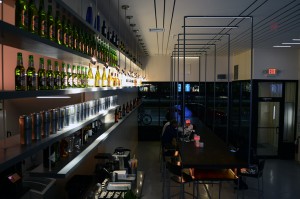A new year on campus brings not only new faces, but also new storefronts and eateries on and around Boston University. On Aug. 12, as Boston was preparing for the coming onslaught of students, Limoo Tea Bar, at 1032 Commonwealth Ave., was opening its doors for the first time.

Situated near BU’s West Campus, next to the Babcock Street T Station, Limoo is a bubble tea house, as well as a bar, serving up several specialty drinks — including bubble tea of the alcoholic variety. Bubble tea is specialty-flavored tea filled with “boba,” a kind of cooked tapioca, or other toppings. The daytime-café-turned-nighttime-bar also features a menu with a mix of American, Asian and Middle Eastern cuisine.
But owner Joe Deng insisted that Limoo is much more than its food and drinks.
“We don’t just sell alcoholic bubble tea here,” he said. “We sell an environment, a feeling.”
He said the idea for Limoo was born out of a great, shared meal and conversation between his business partners, which sparked the “stroke of genius” of creating a food setting based around community. Tea is served with miniature cups for sharing — “not just ‘you get your drink, and I get mine,’” Deng said.
In addition to its platter foods, Limoo is continuing to expand its menu to include more finger foods and “further encourage more sharing and more togetherness.”
Limoo is not a newcomer to the world of bubble tea. Deng already has two traditional bubble tea cafes in western Massachusetts, both called LimeRed Teahouse. But he wanted to take the idea a step further and bring it to Boston.
“Alcoholic bubble tea came about because I wanted something more than vodka cranberry,” he said with a laugh. “When it was time to go out, I would use my bubble tea and mix it with my alcohol, and it was just so delicious…I want to put the taste back into drinking.”
Deng applies this idea of fusion to the food at Limoo as well, offering options such as shwarma “pockets” and a mon-tao burger.
“Our food and drink is very unconventional, and you can’t label that — much like people can’t be labeled,” he said. “That’s why I call it new-age American.”
Limoo caters to students as “a multi-use space: more of a bar toward the weekend and more of a lounge or café during the weekdays,” Deng said. He loves the West Campus spot because he wants Limoo to be a large hangout spot for students.
“I love the student market. I find them to be very open to new ideas,” he said. “They care about the things I care about.”
Deng believes Limoo’s proximity to campus makes it a “very good and viable alternative to the library,” and led him to install outlets about every two feet around the café.
The establishment is divided into two levels so customers can choose their preferred atmosphere. The bottom level is open and casual with wide windows, while the top level is more intimate.
“We want to create a really chill space, like the Central Perk [café] for ‘Friends,’” he said.
Despite Limoo’s unique approach to food and drink, there are quite a few places to get bubble tea in the BU area — specialized spots in Allston like Kung Fu Tea or Infusions Tea Spa, as well as Asian restaurants on campus like Beijing Cafe.
Yet Deng feels his business will stand out among the others because Limoo offers customers a “different brand” of tea.
“Bubble tea has been around for decades,” he said. “But the problem is that people don’t care about quality standards, and that’s what separates us [at Limoo].”
Deng added that Limoo hones in on inclusiveness, because people not only need to be exposed to quality bubble tea, but also to the right kind of environment as well.
“Everybody is welcomed here. We support huge diversity within our staff and the foods that we create,” he said. “That’s how we differentiate ourselves – that’s the different brand.”
The food and drinks at Limoo are homemade. The teas are brewed in-house multiple times a day and made with fresh, high-grade fruits.
“If you try our food, I guarantee you’ll taste the difference,” Deng said.
This is why he believes that, for the price of Limoo’s foods and drinks, “you’re getting a lot more than you think, because I put quality above all else.”
Nevertheless, Deng said he and his chef try to accommodate prices for as many people as possible without sacrificing the attention to detail.
“We’ve been trying to push our $7 drinks, like the Limoo Sangria, the Rosewater Margarita, the Whiskey Green Tea. All those drinks are made in-house…We have dive bar prices in a non-dive bar atmosphere, which we think is a pretty big deal.”
With its premier month under its belt, Limoo is planning to implement changes based on customer feedback. It’s changing its food menu to make it more understandable, creating a take-out menu and is planning to rotate items pretty frequently.
Limoo will also install iPads outside of the café showcasing its food, because “too many people are walking by and look interested but don’t know what’s on the menu,” Deng said.
Although he agreed that many companies will try to “ride the wave” with bubble tea, Deng is confident that Limoo — with its emphasis on community and interactions — will stand out and become a central place for BU students for hang out and study.
At times, when the order counter is empty, Deng and his co-workers can be seen mingling and chatting with the patrons.
“What you can’t copy is the devotion I have to the student body and the welcome-ness we have, the way we train our employees to remember your name,” Deng said. “You’re not just a number here.”






























































































































